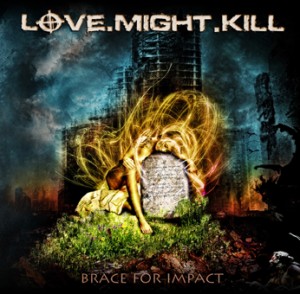Angeli Di Pietra
Anthems Of Conquest
2011
-
“Coming from the heavens, they are riding on the Thunderdragon. Coming from the heavens, they are charging through the sky!” Thus proclaimeth Angeli Di Pietra on the introduction to the opener of their sophomore studio release “Anthems Of Conquest”. While you might at first assume that this band is attempting to be yet another cheap five-cent knockoff of the mighty Rhapsody (Of Fire), it quickly becomes apparent that this is not the band's intent whatsoever. In fact, the band shares much more in common with melodic folk/power like Ensiferum, Trelleborg, Eluveitie, and perhaps Crimfall, though they are not directly comparable with any of these.
A year or so ago I acquired “Storm Over Scaldis”, which was Angeli Di Pietra's first foray onto the field. While the band's first album had some good ideas and melodies, it was a bit roughly hewn for me, and I'm glad to say that they've stepped things up a good bit on their most recent release. Despite being from Belgium, the influences and sounds that have made their way into this work are refreshingly varied. The themes are often Scandinavian (“Last Flight Of The Valkyries”, “Onwards To Asgaard”), but take a number of other interesting turns as well. These include the Middle-Eastern colored “Fate Of The Promised Land” duology, the speed and piratical attitude of “Buccaneers”, and Celtic touches in “Avalon” and “Boadicea”.
This should give you some idea of what "Anthems Of Conquest" is all about: victory songs from various empires and lands, rolled together into a cohesive effort that, while still displaying some immaturity in sound, I'd say accomplishes what it sets out to do. The vocals of Sjoera Roggeman have improved, and she provides a very solid melodic framework around which most of the rest of the music swirls. I remember now that I didn't care for Angeli Di Pietra's harsh vocals in the past, nor do I here. They sound a bit amateurish and indistinguishable, but don't make any major transgressions.
Instrumentally, this album wallows a bit sometimes while trying to find itself. The attempt at blending a number of different influences is admirable, but there are a few points where the guitar players in particular seem to get a bit confused, with the occasional note or notes clashing (and not in an intended fashion) and distracting the listener. However, the overall impression of the work of axemen Smeyers and Sortino is fairly good. In fact, in many ways "Anthems Of Conquest" seems like an exploratory guitar odyssey in building power/folk metal with varying stylistic influences. If only the melodies were a little more hooky, we might really have something to work with.
As another entry in a somewhat crowded genre, "Anthems Of Conquest" sees Angeli Di Pietra beginning to overcome the challenges of the band's (relative) youth, and throw together some very respectable songs like "Last Flight Of The Valkyries" and the title track. Anyone who likes to search the folky reaches of power metal and melodic death for the newest interesting thing is sure to find something that they enjoy here. It's good to see that this band isn't stagnating, and they're well on their way to becoming a solid B grade power/folk/death act (which is not demeaning them at all).
- - -
The Progatonist's Rating: 3.25 out of 5


















